PSYC 1160 Report: Anxiety Disorder and Threat of Health Anxiety
VerifiedAdded on 2022/09/01
|5
|1138
|19
Report
AI Summary
This report examines the relationship between anxiety disorders and health anxiety, focusing on the exacerbating effects of the coronavirus pandemic. The study analyzes a news article from The Washington Post, which highlights the increased mental health risks for individuals with anxiety disorders, including PTSD, OCD, and panic disorder. The report corroborates the article's claims using scholarly literature, emphasizing the comorbidity between anxiety disorders and health anxiety, particularly the role of illness anxiety disorder. The findings suggest that the stress induced by health concerns, especially during the pandemic, can significantly worsen symptoms and trigger panic attacks. The report concludes that the assumptions made in the news article are plausible and supported by scientific research, underscoring the need for interventions and stress management plans in similar situations.
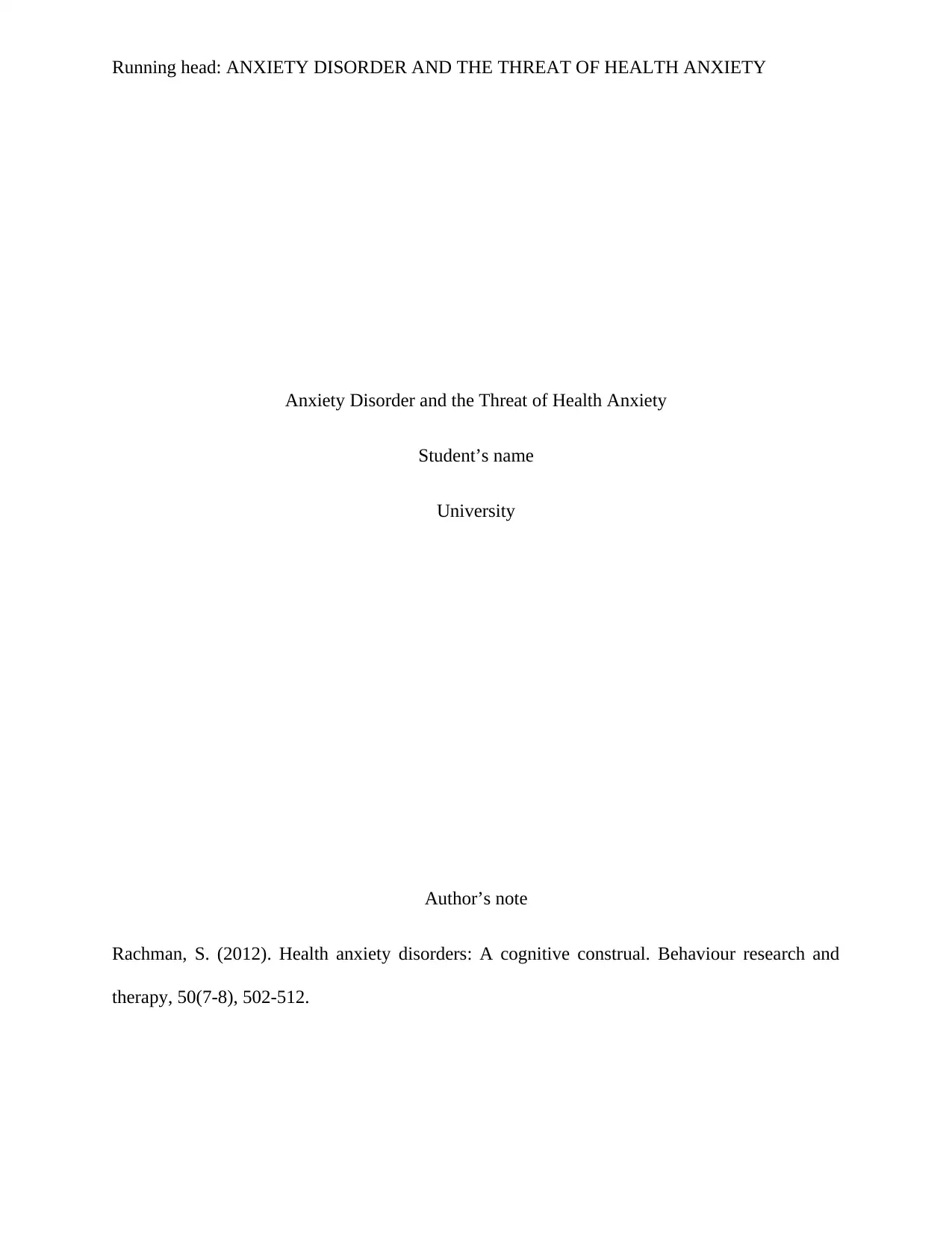
Running head: ANXIETY DISORDER AND THE THREAT OF HEALTH ANXIETY
Anxiety Disorder and the Threat of Health Anxiety
Student’s name
University
Author’s note
Rachman, S. (2012). Health anxiety disorders: A cognitive construal. Behaviour research and
therapy, 50(7-8), 502-512.
Anxiety Disorder and the Threat of Health Anxiety
Student’s name
University
Author’s note
Rachman, S. (2012). Health anxiety disorders: A cognitive construal. Behaviour research and
therapy, 50(7-8), 502-512.
Paraphrase This Document
Need a fresh take? Get an instant paraphrase of this document with our AI Paraphraser
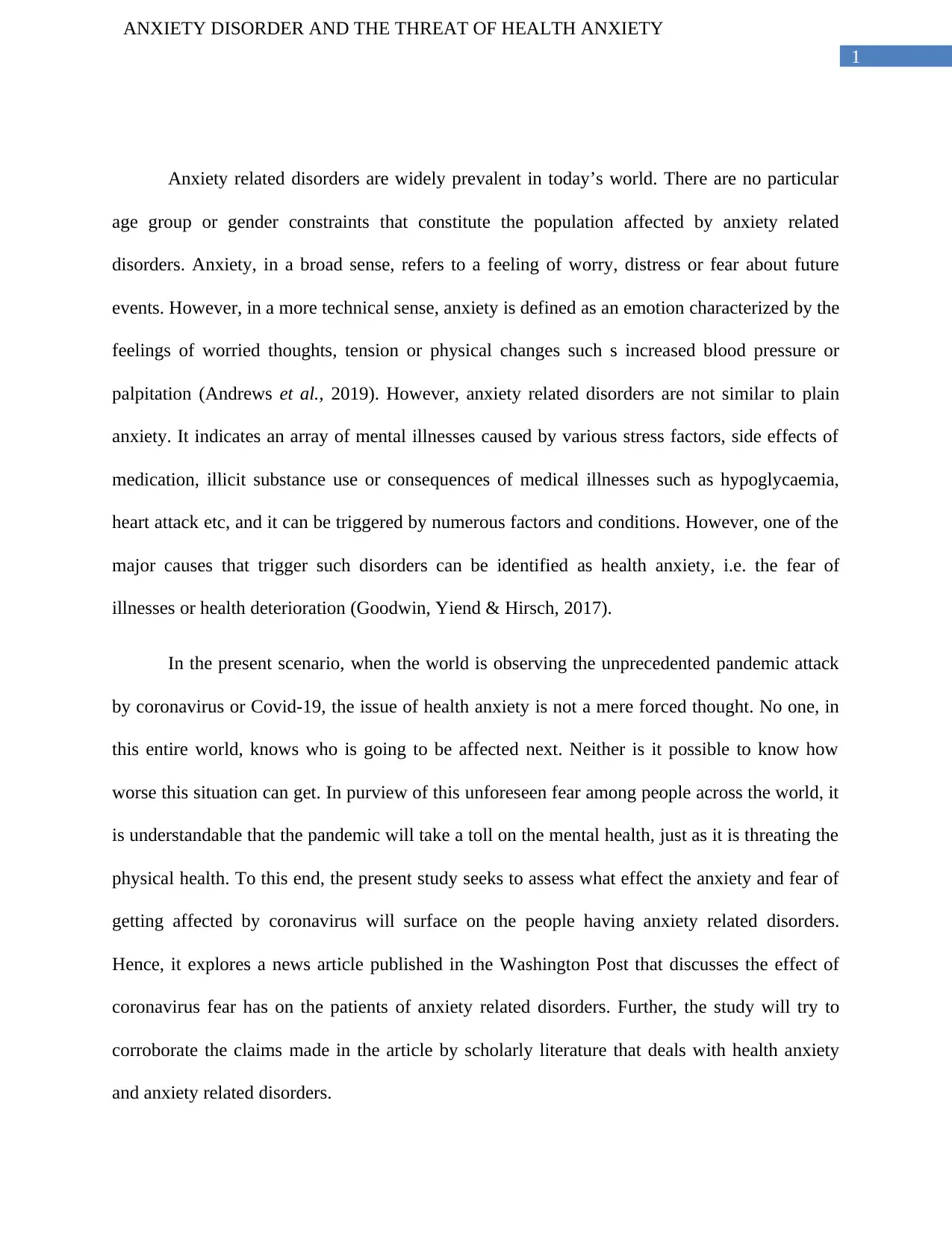
1
ANXIETY DISORDER AND THE THREAT OF HEALTH ANXIETY
Anxiety related disorders are widely prevalent in today’s world. There are no particular
age group or gender constraints that constitute the population affected by anxiety related
disorders. Anxiety, in a broad sense, refers to a feeling of worry, distress or fear about future
events. However, in a more technical sense, anxiety is defined as an emotion characterized by the
feelings of worried thoughts, tension or physical changes such s increased blood pressure or
palpitation (Andrews et al., 2019). However, anxiety related disorders are not similar to plain
anxiety. It indicates an array of mental illnesses caused by various stress factors, side effects of
medication, illicit substance use or consequences of medical illnesses such as hypoglycaemia,
heart attack etc, and it can be triggered by numerous factors and conditions. However, one of the
major causes that trigger such disorders can be identified as health anxiety, i.e. the fear of
illnesses or health deterioration (Goodwin, Yiend & Hirsch, 2017).
In the present scenario, when the world is observing the unprecedented pandemic attack
by coronavirus or Covid-19, the issue of health anxiety is not a mere forced thought. No one, in
this entire world, knows who is going to be affected next. Neither is it possible to know how
worse this situation can get. In purview of this unforeseen fear among people across the world, it
is understandable that the pandemic will take a toll on the mental health, just as it is threating the
physical health. To this end, the present study seeks to assess what effect the anxiety and fear of
getting affected by coronavirus will surface on the people having anxiety related disorders.
Hence, it explores a news article published in the Washington Post that discusses the effect of
coronavirus fear has on the patients of anxiety related disorders. Further, the study will try to
corroborate the claims made in the article by scholarly literature that deals with health anxiety
and anxiety related disorders.
ANXIETY DISORDER AND THE THREAT OF HEALTH ANXIETY
Anxiety related disorders are widely prevalent in today’s world. There are no particular
age group or gender constraints that constitute the population affected by anxiety related
disorders. Anxiety, in a broad sense, refers to a feeling of worry, distress or fear about future
events. However, in a more technical sense, anxiety is defined as an emotion characterized by the
feelings of worried thoughts, tension or physical changes such s increased blood pressure or
palpitation (Andrews et al., 2019). However, anxiety related disorders are not similar to plain
anxiety. It indicates an array of mental illnesses caused by various stress factors, side effects of
medication, illicit substance use or consequences of medical illnesses such as hypoglycaemia,
heart attack etc, and it can be triggered by numerous factors and conditions. However, one of the
major causes that trigger such disorders can be identified as health anxiety, i.e. the fear of
illnesses or health deterioration (Goodwin, Yiend & Hirsch, 2017).
In the present scenario, when the world is observing the unprecedented pandemic attack
by coronavirus or Covid-19, the issue of health anxiety is not a mere forced thought. No one, in
this entire world, knows who is going to be affected next. Neither is it possible to know how
worse this situation can get. In purview of this unforeseen fear among people across the world, it
is understandable that the pandemic will take a toll on the mental health, just as it is threating the
physical health. To this end, the present study seeks to assess what effect the anxiety and fear of
getting affected by coronavirus will surface on the people having anxiety related disorders.
Hence, it explores a news article published in the Washington Post that discusses the effect of
coronavirus fear has on the patients of anxiety related disorders. Further, the study will try to
corroborate the claims made in the article by scholarly literature that deals with health anxiety
and anxiety related disorders.
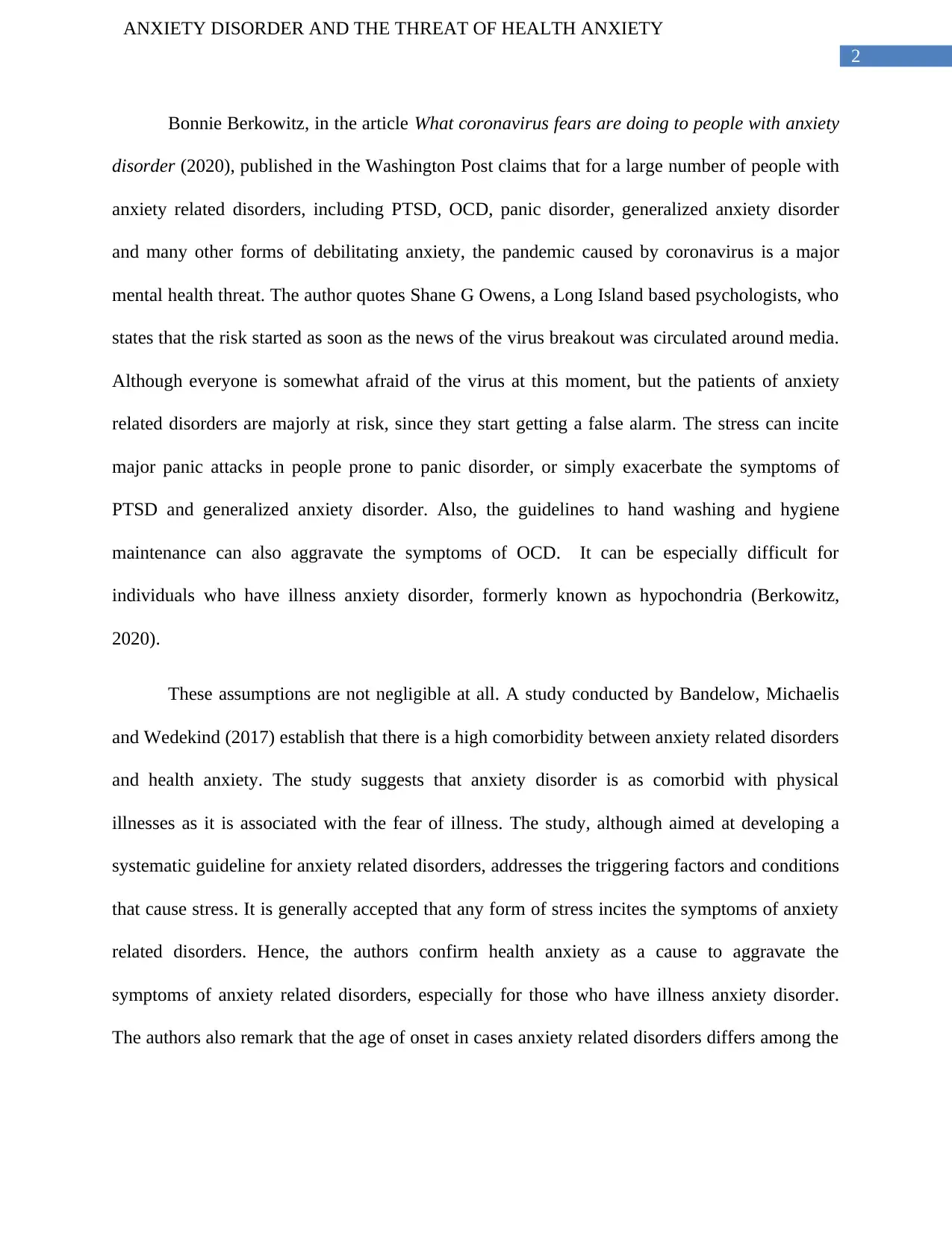
2
ANXIETY DISORDER AND THE THREAT OF HEALTH ANXIETY
Bonnie Berkowitz, in the article What coronavirus fears are doing to people with anxiety
disorder (2020), published in the Washington Post claims that for a large number of people with
anxiety related disorders, including PTSD, OCD, panic disorder, generalized anxiety disorder
and many other forms of debilitating anxiety, the pandemic caused by coronavirus is a major
mental health threat. The author quotes Shane G Owens, a Long Island based psychologists, who
states that the risk started as soon as the news of the virus breakout was circulated around media.
Although everyone is somewhat afraid of the virus at this moment, but the patients of anxiety
related disorders are majorly at risk, since they start getting a false alarm. The stress can incite
major panic attacks in people prone to panic disorder, or simply exacerbate the symptoms of
PTSD and generalized anxiety disorder. Also, the guidelines to hand washing and hygiene
maintenance can also aggravate the symptoms of OCD. It can be especially difficult for
individuals who have illness anxiety disorder, formerly known as hypochondria (Berkowitz,
2020).
These assumptions are not negligible at all. A study conducted by Bandelow, Michaelis
and Wedekind (2017) establish that there is a high comorbidity between anxiety related disorders
and health anxiety. The study suggests that anxiety disorder is as comorbid with physical
illnesses as it is associated with the fear of illness. The study, although aimed at developing a
systematic guideline for anxiety related disorders, addresses the triggering factors and conditions
that cause stress. It is generally accepted that any form of stress incites the symptoms of anxiety
related disorders. Hence, the authors confirm health anxiety as a cause to aggravate the
symptoms of anxiety related disorders, especially for those who have illness anxiety disorder.
The authors also remark that the age of onset in cases anxiety related disorders differs among the
ANXIETY DISORDER AND THE THREAT OF HEALTH ANXIETY
Bonnie Berkowitz, in the article What coronavirus fears are doing to people with anxiety
disorder (2020), published in the Washington Post claims that for a large number of people with
anxiety related disorders, including PTSD, OCD, panic disorder, generalized anxiety disorder
and many other forms of debilitating anxiety, the pandemic caused by coronavirus is a major
mental health threat. The author quotes Shane G Owens, a Long Island based psychologists, who
states that the risk started as soon as the news of the virus breakout was circulated around media.
Although everyone is somewhat afraid of the virus at this moment, but the patients of anxiety
related disorders are majorly at risk, since they start getting a false alarm. The stress can incite
major panic attacks in people prone to panic disorder, or simply exacerbate the symptoms of
PTSD and generalized anxiety disorder. Also, the guidelines to hand washing and hygiene
maintenance can also aggravate the symptoms of OCD. It can be especially difficult for
individuals who have illness anxiety disorder, formerly known as hypochondria (Berkowitz,
2020).
These assumptions are not negligible at all. A study conducted by Bandelow, Michaelis
and Wedekind (2017) establish that there is a high comorbidity between anxiety related disorders
and health anxiety. The study suggests that anxiety disorder is as comorbid with physical
illnesses as it is associated with the fear of illness. The study, although aimed at developing a
systematic guideline for anxiety related disorders, addresses the triggering factors and conditions
that cause stress. It is generally accepted that any form of stress incites the symptoms of anxiety
related disorders. Hence, the authors confirm health anxiety as a cause to aggravate the
symptoms of anxiety related disorders, especially for those who have illness anxiety disorder.
The authors also remark that the age of onset in cases anxiety related disorders differs among the
⊘ This is a preview!⊘
Do you want full access?
Subscribe today to unlock all pages.

Trusted by 1+ million students worldwide
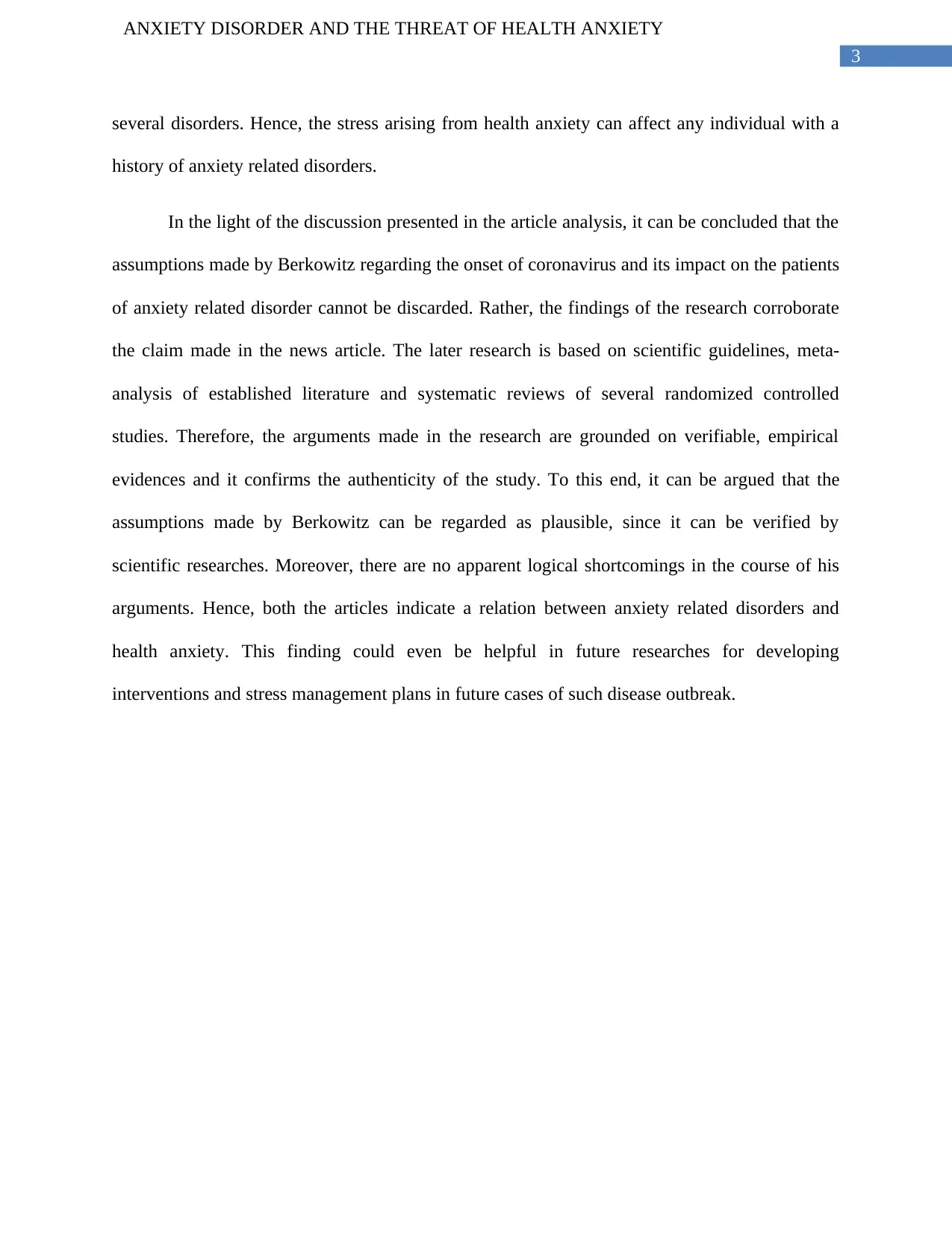
3
ANXIETY DISORDER AND THE THREAT OF HEALTH ANXIETY
several disorders. Hence, the stress arising from health anxiety can affect any individual with a
history of anxiety related disorders.
In the light of the discussion presented in the article analysis, it can be concluded that the
assumptions made by Berkowitz regarding the onset of coronavirus and its impact on the patients
of anxiety related disorder cannot be discarded. Rather, the findings of the research corroborate
the claim made in the news article. The later research is based on scientific guidelines, meta-
analysis of established literature and systematic reviews of several randomized controlled
studies. Therefore, the arguments made in the research are grounded on verifiable, empirical
evidences and it confirms the authenticity of the study. To this end, it can be argued that the
assumptions made by Berkowitz can be regarded as plausible, since it can be verified by
scientific researches. Moreover, there are no apparent logical shortcomings in the course of his
arguments. Hence, both the articles indicate a relation between anxiety related disorders and
health anxiety. This finding could even be helpful in future researches for developing
interventions and stress management plans in future cases of such disease outbreak.
ANXIETY DISORDER AND THE THREAT OF HEALTH ANXIETY
several disorders. Hence, the stress arising from health anxiety can affect any individual with a
history of anxiety related disorders.
In the light of the discussion presented in the article analysis, it can be concluded that the
assumptions made by Berkowitz regarding the onset of coronavirus and its impact on the patients
of anxiety related disorder cannot be discarded. Rather, the findings of the research corroborate
the claim made in the news article. The later research is based on scientific guidelines, meta-
analysis of established literature and systematic reviews of several randomized controlled
studies. Therefore, the arguments made in the research are grounded on verifiable, empirical
evidences and it confirms the authenticity of the study. To this end, it can be argued that the
assumptions made by Berkowitz can be regarded as plausible, since it can be verified by
scientific researches. Moreover, there are no apparent logical shortcomings in the course of his
arguments. Hence, both the articles indicate a relation between anxiety related disorders and
health anxiety. This finding could even be helpful in future researches for developing
interventions and stress management plans in future cases of such disease outbreak.
Paraphrase This Document
Need a fresh take? Get an instant paraphrase of this document with our AI Paraphraser
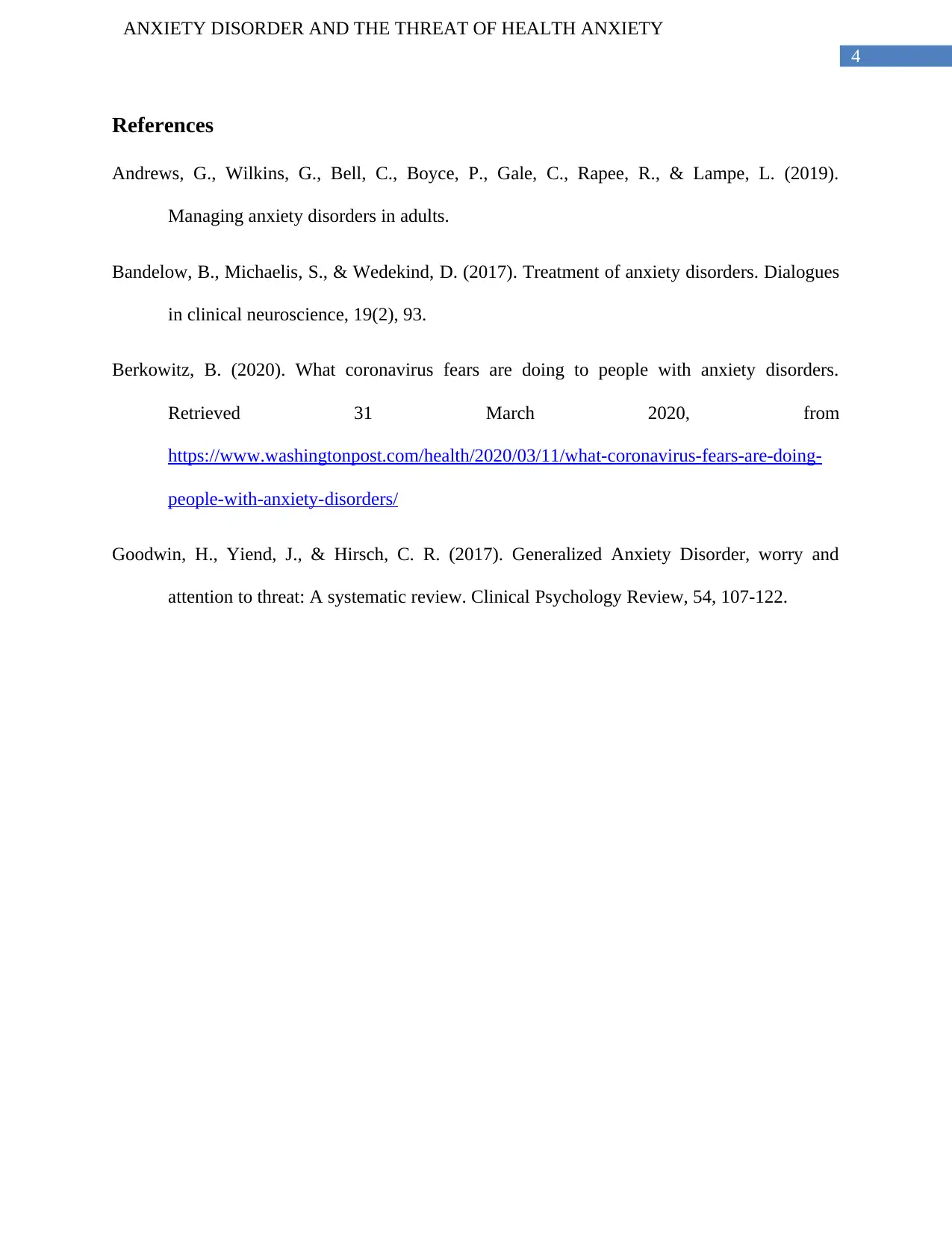
4
ANXIETY DISORDER AND THE THREAT OF HEALTH ANXIETY
References
Andrews, G., Wilkins, G., Bell, C., Boyce, P., Gale, C., Rapee, R., & Lampe, L. (2019).
Managing anxiety disorders in adults.
Bandelow, B., Michaelis, S., & Wedekind, D. (2017). Treatment of anxiety disorders. Dialogues
in clinical neuroscience, 19(2), 93.
Berkowitz, B. (2020). What coronavirus fears are doing to people with anxiety disorders.
Retrieved 31 March 2020, from
https://www.washingtonpost.com/health/2020/03/11/what-coronavirus-fears-are-doing-
people-with-anxiety-disorders/
Goodwin, H., Yiend, J., & Hirsch, C. R. (2017). Generalized Anxiety Disorder, worry and
attention to threat: A systematic review. Clinical Psychology Review, 54, 107-122.
ANXIETY DISORDER AND THE THREAT OF HEALTH ANXIETY
References
Andrews, G., Wilkins, G., Bell, C., Boyce, P., Gale, C., Rapee, R., & Lampe, L. (2019).
Managing anxiety disorders in adults.
Bandelow, B., Michaelis, S., & Wedekind, D. (2017). Treatment of anxiety disorders. Dialogues
in clinical neuroscience, 19(2), 93.
Berkowitz, B. (2020). What coronavirus fears are doing to people with anxiety disorders.
Retrieved 31 March 2020, from
https://www.washingtonpost.com/health/2020/03/11/what-coronavirus-fears-are-doing-
people-with-anxiety-disorders/
Goodwin, H., Yiend, J., & Hirsch, C. R. (2017). Generalized Anxiety Disorder, worry and
attention to threat: A systematic review. Clinical Psychology Review, 54, 107-122.
1 out of 5
Related Documents
Your All-in-One AI-Powered Toolkit for Academic Success.
+13062052269
info@desklib.com
Available 24*7 on WhatsApp / Email
![[object Object]](/_next/static/media/star-bottom.7253800d.svg)
Unlock your academic potential
Copyright © 2020–2026 A2Z Services. All Rights Reserved. Developed and managed by ZUCOL.




